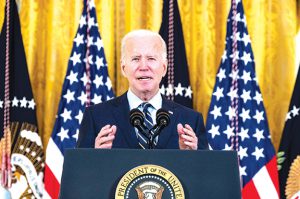Back in 2006, the British comedians David Mitchell and Robert Webb risked a sketch in which they played two Waffen-SS officers towards the end of World War II. Reflecting on the Totenkopf (death’s head) badges on their caps, Mitchell asked the immortal question: “Are we the baddies?â€
An increasing number of anxious American political commentators are asking themselves a version of this question. For some time, it has been a concern of political scientists such as my colleague Larry Diamond that the world is in a “democratic recession†or “regression,†which he dates from around 2006.
I remain less worried about the global trends. Compared with the 1970s or 1980s, according to all the major surveys and databases, the world is a significantly more democratic place.
Not only are there many more democracies (57% of all countries in 2017, compared with 25% in the mid-’70s); democracies also account for around three-quarters of global GDP. The thing we really need to worry about is not global democracy. It is American democracy.
It is not just that, according to a Pew Research Center survey conducted in early February, only one-fifth of US adults regard the promotion of democracy as a top foreign policy objective, putting it at the bottom of a list of 20 choices.
It is not just that this month’s virtual Summit for Democracy, convened by President Joe Biden, was a lukewarm mess. (As David Rothkopf and others were quick to point out, the invitations seem to have been sent out on a wholly arbitrary basis. Inside the velvet rope were Poland, the Philippines, Zambia, Pakistan, Niger and the Democratic Republic of Congo. Left standing on the sidewalk were Tunisia, Hungary, Sri Lanka, Thailand, Bangladesh and Bolivia — all of which score higher on the Economist’s democracy index than Zambia, Pakistan, Niger and the DRC.)
The problem is that the world no longer sees the US as a shining city on a hill — more like a festering slum on a floodplain. According to a survey of adults in 17 advanced economies published by Pew in November, “a median of just 17% say democracy in the US is a good example for other [countries] to follow, while 57% think it used to be a good example but has not been in recent years,†and a quarter say it has never been a good example.
True, that average conceals a wide range of opinions. South Koreans have a far more positive view of the US political system than New Zealanders, for example. But there is widespread agreement abroad that (to quote Pew) “discrimination against people based on their race or ethnicity is a serious problem in the US.â€
Such negative perceptions tally with the various attempts to quantify the health of American democracy. In 2013, for example, the venerable nonpartisan organisation Freedom House gave the US a score of 93 out of 100 in its annual Freedom in the World report.
Today, that figure is down to 83, meaning that the US now ranks below 60 other democracies, including Argentina and Romania. This is because America’s “democratic institutions have suffered erosion, as reflected in partisan pressure on the electoral process, bias and dysfunction in the criminal justice system, harmful policies on immigration and asylum seekers, and growing disparities in wealth, economic opportunity and political influence.â€
Such self-criticism is music to the ears of this country’s strategic rivals.
Earlier this month, the
Chinese Ministry of Foreign Affairs had the audacity
to publish an essay-length critique of American democracy.
The much-vaunted constitutional system of checks and balances has degenerated into a “vetocracy†or “gridlock.â€
—Bloomberg
Niall Ferguson is the Milbank Family Senior Fellow at the Hoover Institution at Stanford University and a Bloomberg Opinion columnist. He was previously a professor of history at Harvard, New York University and
Oxford. He is the founder and managing director of Greenmantle LLC, a New York-based advisory firm. His
latest book is “Doom: The Politics of
Catastrophe”
 The Gulf Time Newspaper One of the finest business newspapers in the UAE brought to you by our professional writers and editors.
The Gulf Time Newspaper One of the finest business newspapers in the UAE brought to you by our professional writers and editors.

